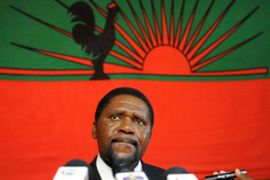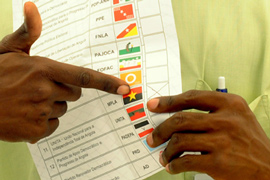Angola opposition appeal rejected
Electoral commission rejects Unita’s claims of “voting irregularities”.

Isaias Samakuva, Unita’s leader, said on South Africa’s SAFM radio on Monday: “There are people that were instructed, who were forced to vote, [for] a particular party. I wonder how this was election was free.”
‘No wrongdoing’
Angolan authorities denied wrongdoing during the election period, but said there were administrative problems in some areas, particularly in Luanda province, home to about 21 per cent of the nation’s 8.3 million voters.
| Timeline | ||
|
|
An extra day of voting was held on Saturday in Luanda.
With almost three-quarters of votes counted from the two-day poll, the MPLA has won nearly 82 per cent of the vote versus Unita’s 10 per cent.
The MPLA, which has been in power since independence from Portugal in 1975, was also ahead in all 18 provinces of the oil-rich nation and was within reach of the necessary two-thirds majority of the 220-seat parliament, which would give it the power to change the constitution.
Organisational problems
European Union monitors, while admitting that the vote, the first in 16 years, had been marred by organisational problems, said they had not endangered the electoral process and that no cases of violence were observed during the campaign or voting.
“The election marks a critical step for democracy despite the organisation difficulties. The Angolan people participated actively and voted freely,” the EU mission said in a statement following a press conference in Luanda.
But Richard Howitt, a UK member of the European Parliament, said he saw foreign voters being bussed into the Cabinda province for the election and that Angolan soldiers had been present at some polling stations.
Luisa Morgantini, the head of the mission, stopped short of declaring the election legitimate and said observers would continue to monitor vote-counting and investigate complaints.
Jose Manuel Barroso, the European Commission president, called the election a step toward consolidating multi-party democracy.
The EU observer team will issue a full report in two months.
The Southern African Development Community (Sadc) had said the poll was “credible, transparent and free”.
Financial observers
 |
|
The MPLA look to have won the election by a landslide [AFP] |
An MPLA victory is likely to be welcomed by investors, particularly oil firms, who are generally comfortable with the government’s pro-business policies.
Angola rivals Nigeria as sub-Saharan Africa’s largest oil producer and its economy grew by 24 percent in 2007.
“It is not going to change the political landscape,” said Indira Campos, a researcher with London-based think-tank Chatham House.
“The same government will carry on as before and it is very favourable to
investors.”
Unita’s Samakuva has ruled out any prospect of the former rebel group taking up arms against the government.
A 27-year civil war between the two sides killed almost half a million people until 2002, when Unita’s former leader, Jonas Savimbi, was killed.
In the last parliamentary election in 1992 the MPLA won 54 per cent to Unita’s 34 per cent.
Unita rejected the results of a parallel presidential race and fighting resumed.
